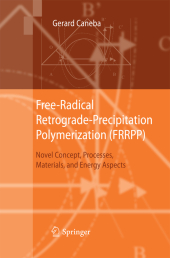 Neuerscheinungen 2014Stand: 2020-02-01 |
Schnellsuche
ISBN/Stichwort/Autor
|
Herderstraße 10
10625 Berlin
Tel.: 030 315 714 16
Fax 030 315 714 14
info@buchspektrum.de |

Gerard Caneba
Free-Radical Retrograde-Precipitation Polymerization (FRRPP)
Novel Concept, Processes, Materials, and Energy Aspects
2010. 2014. xiv, 310 S. 235 mm
Verlag/Jahr: SPRINGER, BERLIN; SPRINGER BERLIN HEIDELBERG 2014
ISBN: 3-642-42434-1 (3642424341)
Neue ISBN: 978-3-642-42434-2 (9783642424342)
Preis und Lieferzeit: Bitte klicken
Providing insight on the free-radical retrograde-precipitation polymerization process, this volume examines the phenomenological aspects in comparison to other materials, such as nanoscale confinement behavior and nucleated hot spots.
The free-radical retrograde-precipitation polymerization (FRRPP) process was introduced by the author in the early 1990s as a chain polymerization method, whereby phase separation is occurring while reactive sites are above the lower cr- ical solution temperature (LCST). It was evident that certain regions of the product polymer attain temperatures above the average ?uid temperature, sometimes rea- ing carbonization temperatures. During the early stages of polymerization-induced phase separation, nanoscale polymer domains were also found to be persistent in the reacting system, in apparent contradiction with results of microstructural coarsening from constant-temperature modeling and experimental studies. This mass con?- ment behavior was used for micropatterning, for entrapment of reactive radical sites, and for the formation of block copolymers that can be used as intermediates, surf- tants, coatings, coupling agents, foams, and hydrogels. FRRPP-based materials and its mechanism have also been proposed to be relevant in energy and environmentally responsible applications. This technology lacks intellectual appeal compared to others that have been p- posed to produce polymers of exotic architectures. There are no special chemical mediators needed. Control of conditions and product distribution is done by p- cess means, based on a robust and ?exible free-radical-based chemistry. Thus, it can readily be implemented in the laboratory and in production scale.
Background.- The FRRPP Concept.- Polymerization Processes.- Product Materials.- Related Energy Application of FRRPP Products.- Outlook.


